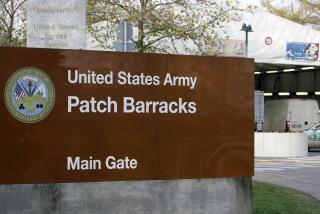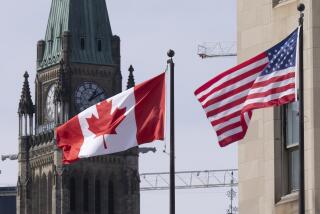Robberies Increase in France, Spain, Guatemala
- Share via
World Travel Watch is a monthly report designed to help you make informed judgments about travel. Because conditions can change overnight, always make your own inquiries before you leave home. In the United States, contact your Passport Agency office; abroad, check in with the nearest American embassy. Europe/Soviet Union
France: Robberies on trains in southern France have increased this year, with thieves silently breaking into sleeper compartments at night and making off with valuables, and sometimes reportedly using Mace and other gases to incapacitate passengers. In response to the problem, France’s National Railroad Service has announced new security measures, including more guards, fewer stops and better locks on sleeper compartments. Routes most affected are those crossing the south from Biarritz to Nice. The NRS reports that there have been 650 arrests made on trains in the first seven months of 1991, as opposed to 879 all of last year.
Spain: Highway robberies have increased in the province of Catalonia, with travelers being robbed when they stop for a rest or being deceived by thieves into thinking they have a flat tire and pulling over to check. More than 200 such robberies have occurred north of Barcelona since June. Eight arrests were recently made, but travelers should avoid stopping at unlit highway rest stops or places along highways where groups of young men are loitering. Drivers should also be wary of anyone suggesting that they pull over for any reason.
Yugoslavia: The situation is deteriorating. Tuesday the State Department issued a travel advisory saying that U.S. citizens should leave Croatia, Bosnia-Hercegovina and Kosovo immediately, and should consider leaving other areas of Yugoslavia as well to avoid increased fighting in the region. The advisory noted that dependents and nonessential employees at the U.S. Consulate General in Zagreb, in the Republic of Croatia, have been authorized to leave.
Soviet Union: Following the failed coup, the U.S. State Department has downgraded its earlier travel warning for the Soviet Union, saying the situtation is rapidly returning to normal. As of press time on Wednesday, the agency advises travelers to continue to “exercise prudence and to avoid crowds and areas of unrest,” however.
Central America/Mexico
Guatemala: Robberies have increased on public buses, both within cities and on highways, including incidents where entire buses have been robbed en route to major tourist destinations. Travel with as few possessions as possible, and leave valuables back at your hotel whenever possible. Robberies have also reportedly increased in the major tourist areas of Guatemala City, Antigua, Panajachel and Chichicastenango. The government requires that foreigners carry their passport, driver’s license or tourist card at all times. Cholera has been reported, and travelers should take appropriate precautions by substituting bottled beverages for water and eating only food that is well-cooked.
Mexico: Three bombs exploded in Mexico City recently at businesses associated with the United States. The bombings took place at dawn outside the IBM headquarters, a McDonald’s restaurant and a Sanborn’s department store. There were no injuries, only minor damage was caused, and no one has claimed responsibility for the acts.
Caribbean
Jamaica: Street crime continues to be a major problem in Kingston. According to the State Department, crime in the capital city is higher than anywhere else in the Caribbean. Walking the city streets at night is not recommended, and public transportation other than licensed taxis should be avoided. In the wake of the State Department’s advisory, the Jamaican government announced increased security measures to protect tourists--and its important tourism industry--that includes an increased police presence in resort areas, security inspections of hotels and villas, improvement of roads and removal of squatter communities from resort areas.
Asia
South Korea: Thousands of students demonstrated in Seoul recently, not against the current government but for unification with North Korea. The demonstrations turned violent when the students were prevented from marching to the border. Such protests can disrupt transit, but usually do not have much impact on travel within the country so long as travelers avoid these large gatherings.
Africa
Madagascar: Protests against the 16-year rule of President Didier Ratsiraka’s Socialist government have turned violent and a dusk-to-dawn curfew is now in effect in the capital city of Antananarivo and its suburbs. The turmoil has produced strikes and severe fuel shortages, and made the periodic closure of the international airport likely. Violent street crime has increased dramatically in downtown Antananarivo, with gangs attacking and robbing foreigners during both the daytime and evening hours. Avoid travel here until further notice.
Rwanda: Hostilities continue between government forces and Rwandan exiles from Uganda. Fighting has been reported near the Akagera Game Park and Volcano National Park, and travel to these places is often impossible. A curfew remains in effect throughout the country. Avoid nonessential travel here.
For more information on safety concerns in countries you may be visiting, contact the Citizens Emergency Center, U.S. Department of State, Washington, D.C. 20520, (202) 647-5225.
More to Read
Sign up for Essential California
The most important California stories and recommendations in your inbox every morning.
You may occasionally receive promotional content from the Los Angeles Times.












